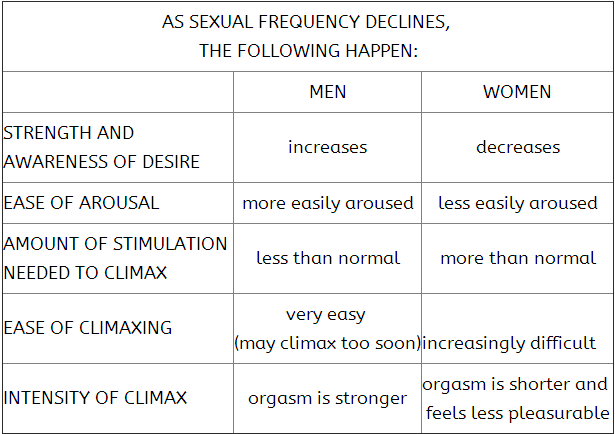The inverse of your first question might hold generally true: that desired sexual frequency could influence a woman's actual sexual frequency.
Willoughby and Vitas (2012) conducted a study focusing on the sexual desired discrepancy between male and females. They make reference to sexual desire discrepancy (SDD) - difference between one's desired frequency of sexual intercourse and actual frequency of sexual intercourse.
High SDD may then lead some females to put more resources into the
relationship in order to work toward future sexual contact and
increase the intimacy and closeness in their relationship. In this
way, SDD may serve among female partners as a motivator to enhance and
support the relationship as it progresses toward higher sexual
frequency.
It mainly would depend on the quality and satisfaction of the sexual intercourse that would determine whether a woman's desire for greater sexual frequency would increase or not. Assuming that quality and satisfaction of sexual intercourse is high for the woman, I would say that this would increase a woman's future desire to have sex. Processes on positive expectancies give rise to higher perceived quality of the sexual relationship (McNulty & Fisher, 2008) and thus, in my opinion, if the woman expects sexual intercourse to be as good as a prior experience, they're more likely to desire it more.
So, perhaps deprivation or excess of sexual intercourse and expectancies of quality of sexual intercourse plays a major role in moulding sexual desire for women. Another thing: while the frequency of sex is predicated on the physical rewards of it for men, this may not be necessarily true for women.
References
- Willoughby, B.J. & Vitas, J. (2012). Sexual desire frequency: The effect of individual differences in desired and actual sexual frequency on dating couples. Archive of Sexual Behavior, 41, 477-486.
- McNulty, J.K. & Fisher, T.D. (2008). Gender differences in response to sexual expectancies and changes in sexual frequency: A short-term longitudinal study of sexual satisfaction in newly married couples. Archive of Sexual Behavior, 37, 229-240.
